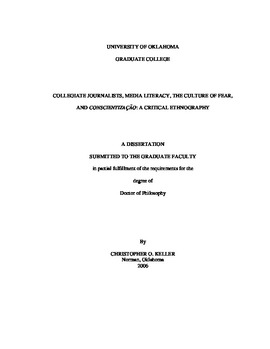| dc.contributor.advisor | Bradshaw, Amy C., | en_US |
| dc.contributor.author | Keller, Christopher O. | en_US |
| dc.date.accessioned | 2013-08-16T12:20:24Z | |
| dc.date.available | 2013-08-16T12:20:24Z | |
| dc.date.issued | 2006 | en_US |
| dc.identifier.uri | https://hdl.handle.net/11244/1107 | |
| dc.description.abstract | This qualitative project explored collegiate journalists' experiences with a mass-media generated Culture of Fear and investigated the theoretical interconnections of this culture, journalism education, college newspaper advisement, and the awakening of Freirian critical consciousness, or Conscientizacao. | en_US |
| dc.description.abstract | A tremendous amount of power and responsibility rests with individuals who create mass media products, and likewise with educators who teach and mentor the creators of these mass media products. Media literacy instruction and education for critical consciousness may positively impact traditional journalism curricula and provide journalism educators resources in which to address the quickly evolving and dynamic nature of modern mass media. | en_US |
| dc.description.abstract | Five 20- to 45-year-old undergraduate journalism student editors, staff writers, and photographers for the campus newspaper at a regional university in the southwest United States participated in the study, and archival data from introductory journalism courses taught by the researcher were utilized as data as well. The researcher also serves as the faculty adviser to the campus newspaper for which the student editors work. This study draws upon models of research and analysis found in both ethnographic and phenomenological qualitative traditions. Three dominant themes emerged during analyses: "The Culture of Fear, " "Media Literacy, " and "Conscientizacao and Education for Critical Consciousness." Several sub-themes emerged within each macro-level theme. While this project began as an examination of collegiate journalists' experiences with a mass-mediated Culture of Fear, media literacy, and Freirian notions of critical consciousness, the researcher also was able to begin critically defining the role he played as an educator for critical consciousness within a journalism curriculum and as a collegiate publication adviser. | en_US |
| dc.format.extent | x, 186 leaves ; | en_US |
| dc.subject | College students United States Social conditions. | en_US |
| dc.subject | Mass Communications. | en_US |
| dc.subject | Freire, Paulo, 1921-1997. | en_US |
| dc.subject | Journalism, College Sociological aspects. | en_US |
| dc.subject | Media literacy. | en_US |
| dc.subject | Journalism Study and teaching (Higher) United States. | en_US |
| dc.subject | Journalism. | en_US |
| dc.subject | Consciousness. | en_US |
| dc.subject | Education, Philosophy of. | en_US |
| dc.title | Collegiate journalists, media literacy, the culture of fear, and Conscientizacao: A critical ethnography. | en_US |
| dc.type | Thesis | en_US |
| dc.thesis.degree | Ph.D. | en_US |
| dc.thesis.degreeDiscipline | Department of Educational Psychology | en_US |
| dc.note | Adviser: Amy C. Bradshaw. | en_US |
| dc.note | Source: Dissertation Abstracts International, Volume: 67-10, Section: A, page: 3752. | en_US |
| ou.identifier | (UMI)AAI3237840 | en_US |
| ou.group | Jeannine Rainbolt College of Education::Department of Educational Psychology | |
